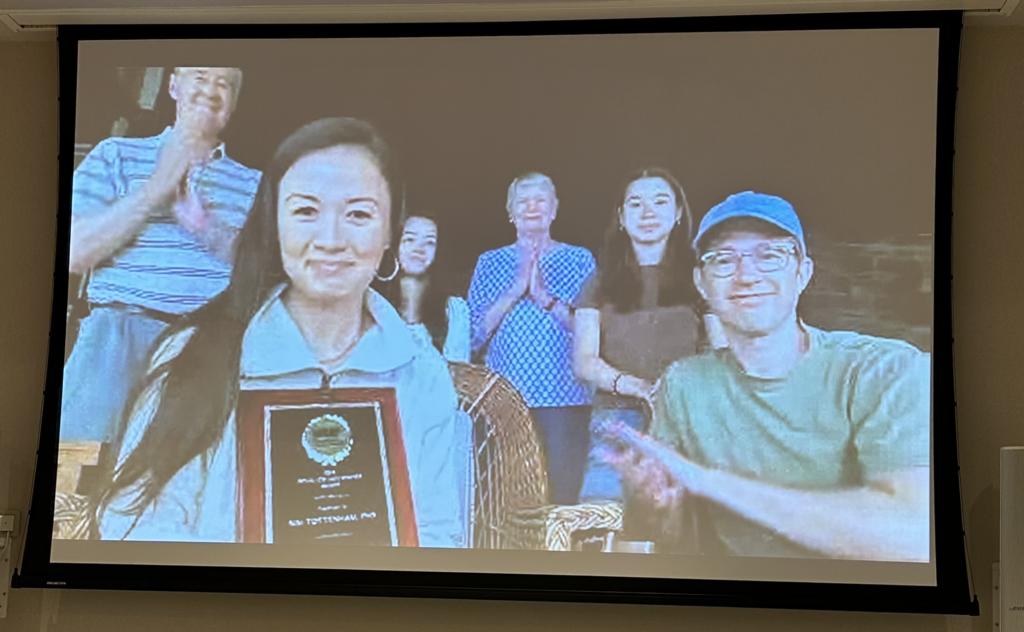The 2023 Rovee-Collier Mentor Award Winner: Nim Tottenham, PhD
Nim Tottenham, PhD
Professor of Psychology
Columbia University
Department of Psychology
New York, NY USA
Lab twitter: @DANLAB_Columbia
Nim Tottenham, PhD is a Professor of Psychology, Director of the Developmental Affective Neuroscience Laboratory, and Chair of the Psychology Department at Columbia University. Her research examines the development of emotional behavior and associated brain maturation. In particular, her research has highlighted the powerful role that early experiences, such as caregiving and stress, has in brain development. She has authored over 130 journal articles and book chapters. She is a frequent lecturer both nationally and internationally on human brain and emotional development. She is a Fellow of the Association for Psychological Science and of the Society for Experimental Psychologists. Her scientific contributions have been recognized by the National Institute of Mental Health BRAINS Award, the American Psychological Association’s Distinguished Scientific Award for Early Career Contribution to Psychology, the National Academy of Sciences Troland Research Award and the Flux Congress Linda Spear Award.

Carolyn Rovee-Collier (April 7, 1942 – October 2, 2014) was a Professor of Psychology at Rutgers University. She was a pioneer and an internationally renowned expert in cognitive development. Over the course of her distinguished career, Carolyn received numerous honors and awards including the Senior Scientist Lifetime Contribution Award from the International Society for Developmental Psychobiology. She was elected to The Society of Experimental Psychologists in 1999 and received that society’s prestigious Howard Crosby Warren Medal in 2003. Carolyn received a James McKeen Cattell Fellowship, a Medal for Distinguished Achievement from the Brown University Graduate School, and the biannual Award for Distinguished Scientific Contributions to Child Development from the Society for Research in Child Development. Her oral history has been recorded and placed in the public archive of The Society for Research in Child Development’s Oral History Project. Carolyn’s research on infant learning and memory received continuous NIH funding for over 35 years, including an NIMH MERIT Award and two successive NIMH Research Scientist Awards. She served for 18 years as Editor of Infant Behavior & Development in addition to serving as co-editor (with Lipsitt) of Advances in Infancy Research (Vols. 3–12), President of the International Society for Developmental Psychobiology, the International Congress of Infant Studies and the Eastern Psychological Association.
Carolyn was also a firm believer in serendipity. Her hallmark task, the mobile conjugate reinforcement paradigm, was developed as a means to settle her own fussy infant. While trying to write her dissertation, Carolyn used a hair ribbon to connect her son’s ankle to his overhead mobile. She stood by her son’s crib and watched as he quickly learned to control both the rate and vigor of the mobile’s movements by altering his foot kicks. Her first publication (Rovee & Rovee, 1969) set the stage for the uphill scientific battle that would dominate her career. Her demonstration of operant conditioning by very young human infants flew in the face of traditional Piagetian theory. Despite her rigorous experimental methods, it took years to get that paper published. Her subsequent work on infant long-term memory (Rovee & Fagen, 1976; Rovee-Collier, Sullivan, Enright, Lucas, & Fagen, 1980) was similarly controversial because it was inconsistent with the prevailing view that infant memory was poor. Her theoretical work presents a direct challenge to current neural models of memory development (Rovee-Collier & Giles, 2010; Rovee-Collier, Hayne, & Colombo, 2001).
Above all else, Carolyn was highly committed to training graduate students and other emerging researchers. Over the course of her career, she mentored dozens of PhD, master’s, and undergraduate research students. She taught them everything that they needed to know to succeed in their careers — for example, that spelling counts, and that just because a reviewer (or an editor) says something doesn’t make it so. Most importantly, she taught them that some battles are definitely worth fighting. Like any great coach, Carolyn pushed people to their limits, but she never asked more from others than she was willing to do herself. She was always the first person in the lab in the morning and the last one to leave. Working with Carolyn was a cross between boot camp and a luxurious bed and breakfast: She might keep you up working for 2 to 3 nights in a row, but during that time, she generously provided ample amounts of home cooking and southern hospitality. For those of us who had the privilege of working with her, Carolyn Rovee-Collier was always our staunchest critic and our fiercest ally. Speaking on behalf of her students, her postdocs, her colleagues, and her friends, it is safe to say that we all drew an immeasurable degree of personal and professional strength knowing that Carolyn was in our corner. The Carolyn Rovee-Collier mentorship ISDP Award celebrates this level of support in other exceptional ISDP mentors.
Rovee-Collier Mentor Award Winners:
- 2022 Rovee-Collier Mentor Award: Clancy Blair, PhD, MPH More Details & Presentation Video
- 2021 Rovee-Collier Mentor Award: Megan Gunnar, PhD More Details & Presentation Video
- 2020 Rovee-Collier Mentor Award: Martha Ann Bell, PhD More Details & Presentation Video
- 2019 Rovee-Collier Mentor Award: Joanne Weinberg, PhD
- 2018 Rovee-Collier Mentor Award: Ruth Grunau, PhD
- 2018 Rovee-Collier Mentor Award: William P. Fifer, PhD
- 2017 Rovee-Collier Mentor Award: George F. Michel, PhD


